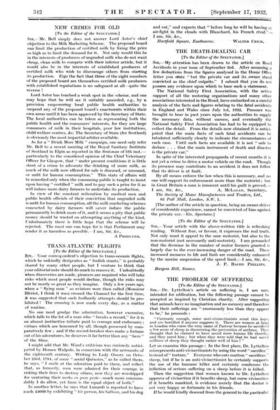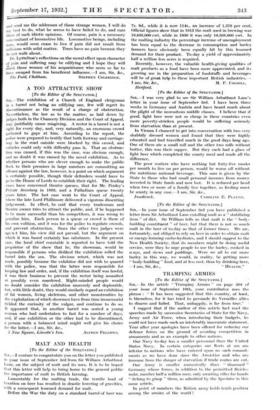THE PROBLEM OF SUFFERING [To the Editor of the SPECTATOR.]
SIR,—Dr. Lyttelton's article on suffering is, I am sure, intended for edification, but the following passage cannot be accepted as inspired by Christian charity. After suggesting that animals have no imagination and no memory and therefore that their sufferings are " enormously less than they appear
to be," he proceeds : ;
" Curiously enough, some anti-vivisectionists scout this hope, and are horrified if anyone suggests it. There are women at large in London who curse the very name of Pasteur because he sacrificed a few score of sheep in discovering the prevention of anthrax. They thought that he claimed to have saved there human life thereby, and they rated him ; but when they were told that he had saved millions of sheep they thought rather well of him ! "
Let us examine this passage : In the first place, Dr. Lyttelton
misrepresents anti-vivisectionists by using the word " sacrifice " instead of " torture." Everyone who eats mutton " sacrifices " sheep, but if he is an anti-vivisectionist he certainly supports the use of the humane killer and certainly condemns the infliction of serious suffering on a sheep before it is killed.
Then the suggestion that women known to-Dr. Lyttelton approve of vivisection if it benefits sheep, but curse vivisection
if it benefits mankind, is evidence merely that the doctor is not very happy or fortunate in his friends.
If he would kindly descend from the general to the particular
and send .me the addresses of these strange women, I will do my best to do, what he seems to have failed to do, and cure them of such idiotic opinions. Of course, pain is a necessary concomitant of locomotive life. Locomotive beings, including man, would soon cease to live if pain did not result from collisions with solid matter. Trees have no pain becauSe they do not walk about.
Dr. Lyttelton's reflections on the moral effect upon character of pain and suffering may be edifying and I hope they will reach those women of his acquaintance who seem so far to have escaped from his beneficent influence.—I am, Sir, &c.,































 Previous page
Previous page